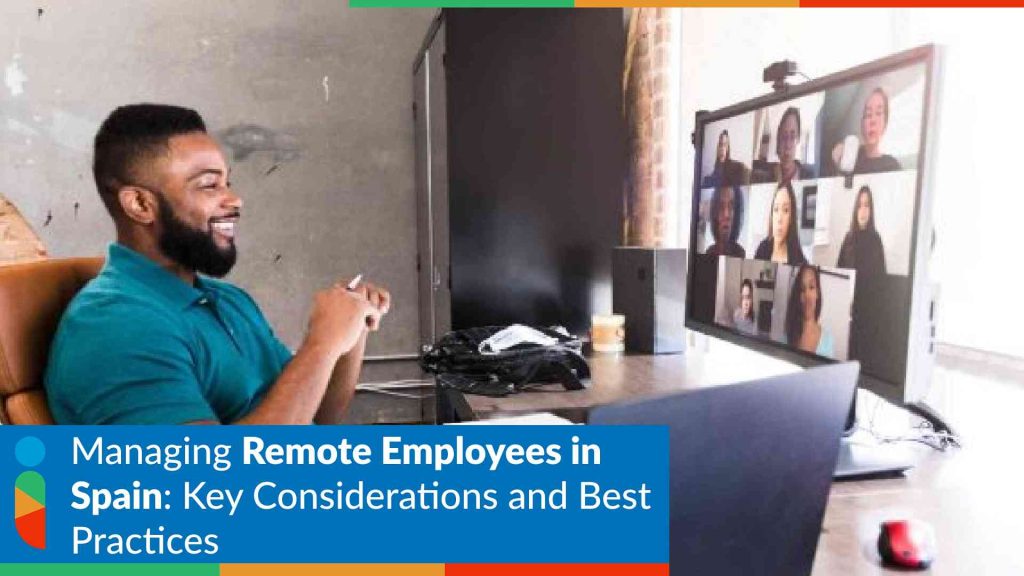Globalization is no longer limited to the greatest corporations. It is now uncommon to discover a non-international supply chain, production line, support and development teams, or fulfillment strategy. As a result of this transition, more organizations are employing remote employees in Spain and other regions to expand; which frequently restructures management structures, oversight capacities, and company culture.
Remote work in Spain – Laws & Regulations
“As an example, an individual is deemed a tax resident and obligated to pay taxes in Spain if they stay there for more than 183 days. However, a rule pertaining to remote work in Spain was passed in 2022, allowing employees to reside and work remotely in Spain for a maximum of three years.“
In this article, we will be talking about some of the best practices to hire and manage remote employees in Spain. It is no surprise that remote work is becoming increasingly popular: less time spent traveling, the opportunity to operate from anywhere, and worldwide hiring. Let us see the best practices to manage a remote team:
1. Do you know who are remote workers?
2. Know the key considerations to manage remote employees in Spain
3. Learn the best practices to manage your remote employees in Spain
4. Establish a remote team in Spain with us

Do you know who are remote workers?
Employees who work from a location other than an employer-operated headquarters are considered remote. Remote work sites include a worker’s home, a co-working space, a private room, another communal place, or any location other than the traditional workplace structure or campus.
Remote work’s potential benefits, such as shorter or no commute times, easier recruiting and employment, and greater productivity, all add to its long-term public appeal.
Although working from home is a sort of remote work, the two concepts are not always synonymous. The term “remote working” does not refer to a specific location; rather, it indicates that an individual rarely works out of a regular office. Consequently, remote workers may work from home, although this is not essential.
Know the key considerations to manage remote employees in Spain
Remote employees must be productive if there is a cultural expectation that teams or individuals will regularly operate without much supervision. While no precise guidelines exist for this strategy plan, maintaining a profitable remote workforce often necessitates the following characteristics:
Reliable connectivity
Virtual teams require quick internet access and mobile technology that can endure continuous employee involvement.
Although managing remote teams isn’t all that different from managing teams based on-site, virtual labor can complicate the role of the leader. Managers who are in the office or leading people remotely experience the same basic challenges wherever they are.
Modern tools
Remote employees must be able to work together equally as effectively as if they were all there at the same time. For modern tools like chat, teleconferencing, sharing of documents, laptops, and other common corporate hardware and software, this demand demands for safe, high-quality apps and platforms.2.3 Healthy culture
High-performing remote teams frequently have cultures that value integrity and collaboration more than “FaceTime” or traditional office hours. Such cultural differences are encouraged and given the resources it needs to thrive in a management culture that promotes remote work.
Updated policies
Review the company’s remote work policies. Policies should outline the organization’s expectations for remote workers; covering the best working conditions, productivity benchmarks, and security measures for sensitive data. They should also cover the right technology, IT, and cybersecurity.
Better follow-ups
The most effective one-on-one interactions go beyond simply discussing productivity. They can also be useful tools for keeping remote workers engaged and motivated.
Whether daily, weekly, or bimonthly, scheduling one-on-one calls is a wonderful idea because it can:
- Identify the employee’s overall performance.
- Together with the employee, identify and eliminate bottlenecks.
- Discuss the employee’s plans for future professional development.
- Answer any questions.
Clear productivity standards
It is important to set up certain expectations when discussing performance standards with your remote workers. Depending on the position, different productivity standards may apply, while others may be the same across the board.
Although keeping track of productivity standards might seem like an extra step that is not necessary, it might be useful for seeing patterns that need to be watched. Therefore, it might help you spot burnout or the need for more training to get rid of a productivity-robbing bottleneck.
Robust team building
For a successful remote work culture, creating cooperative, conversational groups that are concerned about one another’s performance is crucial. This might involve social events, retreats, and other customs like praising both team and individual achievements. As a result, your team building is crucial.
Top-notch tech
Companies with highly efficient remote teams make investments in the tools that let their staff members carry out their responsibilities. This includes laptops or desktop computers, quick broadband, trustworthy and user-friendly software, and other business-specific technologies.
Learn the best practices to manage your Remote employees in Spain
The obstacles that the remote work environment presents can be overcome with the proper leadership strategies. The top methods for leading remote teams are outlined here.
Be culture sensitive
You might collaborate and work with personnel from various cultural backgrounds if you manage remote employees in Spain. If you decide to work remotely, you must be open to experiencing and embracing diverse cultures. As a result, it is critical to respect cultural differences if you want your collaboration to run smoothly.
Build a structure
Structure in the workplace enables more natural and efficient communication. The manager can determine whether their employee is overworked or has time for additional projects by doing scheduled employee check-ins. Additionally, it is crucial to have a set time when staff members can speak with the management about any issues they may be having.
Create routines
A routinely structured work atmosphere keeps things running smoothly. Having a morning meeting where the manager provides a summary of the current and impending tasks is one example.
Furthermore, it is possible to schedule meetings through the day to ensure that workers complete their tasks quickly and without error. Even if these meetings are essential for a productive workplace. It is also crucial to remember that shorter meetings are better for communication and problem-solving.
Focus on results
To boost employee engagement, it is important to place more emphasis on results than on activities. Allowing employees to decide how to finish the assignment will empower them. Following a clear definition of the desired results, you must take a step back and give employees the reins.
Ask workers to focus on doing the work effectively rather than finishing their allotted number of hours for the day. Establish goals, timelines, and regular meetings for efficient work progress in order to achieve these results. Employee awareness of their roles within the project is essential to its success and fosters strong teamwork.
Be flexible
Every employee has a unique environment since remote work is conducted in a setting that differs from a traditional office.
Some workers could have wives, kids, a private office, or just a desk in their hectic home. Managers have a responsibility to comprehend the various work conditions that remote workers experience.
The flexibility that remote work affords is among its most alluring features. As long as the task is completed in accordance with the requirements of the organization, having flexible schedules grants freedom and responsibility. When it comes to how their staff members want to work and finish tasks, managers should be accommodating and encourage employee input.
Recognize achievements
As vital as it is to complete the work in accordance with the company’s standards, it is also essential to reward exceptional achievement. In order to recognize outstanding performance among employees, it is important to use communication tools like Slack or Zoom because remote employment offers few opportunities for face-to-face encounters. To encourage outstanding performance among all employees, you could, for instance, designate a Slack channel solely for employee recognition.
There is no justification for recognizing achievement solely for meeting organizational requirements. It also involves acknowledging milestones for the team, such as birthdays and more.
Be equal
Since each employee plays an equally significant role, it is crucial to treat them all fairly. By involving everyone, you give each person a sense of importance and inclusion within the team.
If certain employees were not there when you and your team agreed to adopt a certain course of action, it is essential to let them know about it and to explain their duties. They are able to feel valued by the team as a result.
Promote communication and cooperation
Remote team-building exercises can be used to promote communication and cooperation. Planning social Zoom sessions for conversation and interaction is an illustration of boosting social interaction.
Since remote workers are virtual only, you can counteract social isolation by providing opportunities for cooperation and interpersonal engagement. On days when workers join the Zoom conference, it can be a good idea to schedule 15-minute coffee breaks to allow for conversation and relaxation. This is a fantastic approach to foster a sense of community and get to know your coworkers better.
Check in with workers
Scheduled daily check-ins help managers and their staff members communicate more effectively. These check-ins can be conducted via email, text message, or video call thanks to all the benefits that technology has to offer. This compensates for the employees’ accustomed absence of face-to-face communication.
Employees have the chance to communicate their problems and how they are handling the task during scheduled check-ins. Communication gives you the chance to monitor employee output and contributes to the establishment of order in the workplace.
Provide feedback
Managers must have one-on-one meetings with staff members during which they offer informal as well as formal feedback. This ongoing feedback is essential for raising employees’ performance standards. Employees who work remotely are unable to observe how others are performing, which makes it difficult for them to find ways to improve their performance.
Feedback is not just for specific projects; it may also cover things like expectations, objectives, failures, and how well a person is performing in their job. It is important to offer this criticism calmly, acting more like a mentor than a mean teacher.
Set responsibilities and expectations
Before beginning a new project or giving someone a task, managers need to establish clear expectations for what must be accomplished. You can define rules, expectations, and boundaries during this process. Rules must be made clear, and any inquiries that may come up during the process must be addressed. You should list each participant’s obligations in order to establish clear expectations.
The company’s values should be one of the obvious expectations that all employees are aware of. It is the responsibility of managers to ensure that staff members comprehend the company’s objective, and this is true even if they are working remotely.
Trust
One of the most crucial elements of leading remote teams is trust. To build a trustworthy relationship, it is crucial to be constant in your communication and to only contact your manager when absolutely necessary. Trust promotes teamwork among team members and higher levels of production.
Communication
Tasks, responsibilities, and outcomes of a team depend on effective communication. As each employee has a different task, communication must be maintained because the remote work environment does not consist of a permanent physical location where coworkers can interact face to face.
While keeping in touch with coworkers is important, it is equally crucial to keep in touch with your manager. Since the manager is in charge of everything, he or she must ensure that there is open communication among all staff members in order for everything to run well.

Establish a remote team in Spain with us
Although there are numerous activities on the list, it is crucial to remember that each technique is just as important and has an impact on the others. Without communication, productivity monitoring is impossible, and without efficiency monitoring, workers won’t be able to trust one another because some will not be productive.
While it is important that managers adhere to each of these guidelines, it is equally vital that staff members do the same. Adopting the techniques mentioned above will lead to a productive workplace and a successful team.
If you want to establish a remote team and expand through Spain, our Employer of Record solutions are the best alternative for you. With our support, you will be able to hire remote employees in Spain while following employment laws. Consequently, you can set a business presence and enjoy the benefits of developing through the region. In addition, we can also help you relocate employees and more! Get in touch with our Iberia EOR team and start your process now!






